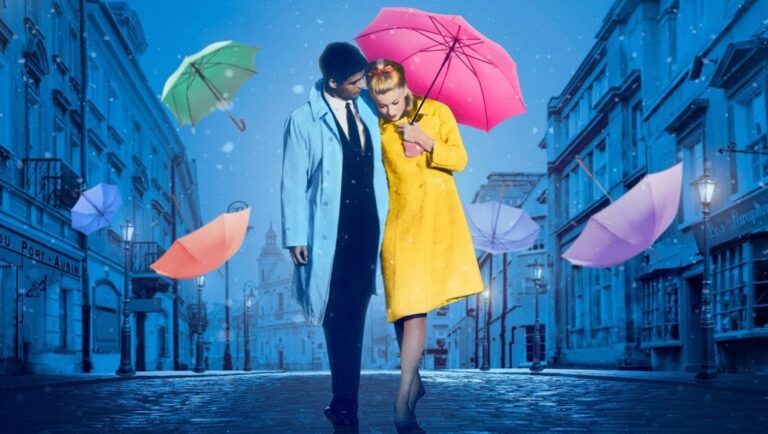Would Jacques Demy’s The Umbrellas of Cherbourg still be an effective movie if it wasn’t entirely sung-through? It seems like an impossible question to answer for arguably the greatest of all film musicals. The film itself even acknowledges the technique’s own absurdism by having a man poke into the umbrella shop to sing for directions. Opera comparisons are encouraged by the film itself: if opera wasn’t sung in a certain style then it wouldn’t be opera, and if The Umbrellas of Cherbourg weren’t sung, it wouldn’t be The Umbrellas of Cherbourg. A few of Jacques Demy’s other films that merely use the occasional musical number in between spoken dialogue, most notably The Young Girls of Rochefort, are a demonstration of the fact that he could still make masterpieces without using this particular technique. The ever-present singing in Umbrellas is still the ultimate tonal heightener, but it would probably be seen as a gimmick and a curio if it wasn’t for how thoroughly everyone involved rose to the occasion. Michel Legrand turned in a fearsomely heartbreaking score that stole from pop music and Romanticism alike, composed almost entirely of semi-recitative arias. Demy paired it with some of the most dazzlingly bright colors in cinema, and what is probably the most technically perfect dubbing work ever done for a film (Legrand supposedly compared the actors’ on-set singing, a key part of why the lip-syncing is so convincing, to crows). It won the Palme d’Or at the Cannes Film Festival from a jury headed by sound film pioneer Fritz Lang, and even if it hadn’t immediately pushed Catherine Deneuve to arthouse superstardom, its influence would still be vast: one of only two musicals to subsequently win the Palme was Lars von Trier’s Dancer in the Dark, which borrowed Demy’s approach of deconstructing musical fantasies and took it to one of Von Trier’s typically harrowing extremes. It certainly seems incredibly churlish to hobble one of the French New Wave’s finest movie homages by taking out what made it most special, even for a thought experiment.
Still, even though The Umbrellas of Cherbourg is easy to summarize on a plot level and the style is what’s easiest to talk about, its complexity as a script is under-discussed and the film could probably stand on its own two feet nicely as a drama. (The films of Marcel Pagnol, with their small towns and unwed mothers, provide a rough idea of what it could look like.) Guy the mechanic and Geneviève the umbrella shop employee are young and in love. Geneviève’s financially struggling single mother Mme. Émery owns the umbrella shop and isn’t terribly fond of their relationship due to Guy’s lack of money, and neither is Madeleine, the woman who takes care of Guy’s sick aunt and has an unrequited crush. Guy is called to serve in the Algerian War and stops writing due to combat injuries, Geneviève becomes pregnant from their first and last night of lovemaking, and she has to choose between staying true to Guy or marrying the wealthy diamond merchant Roland Cassard. Cassard has fallen in love with her after a long period of loneliness, and he was already the protagonist of his own movie: Jacques Demy had him fall in love with the titular Lola in his black-and-white debut feature, and when the film revisits the Nantes locale where Lola took place as he sings his piece, it’s in a flashback that gives it color but removes all the life: you can’t return to the past.
Cassard’s heartbreak predates The Umbrellas of Cherbourg, which might explain why he bonds so easily with the widowed and desperate Mme. Émery: their pain comes from an entirely different movie that predates this one, but it’s still affecting the next generation when it gets in the way of Guy and Geneviève. The frankness behind who pushes for financially-driven marriages and continues unhealthy cycles is only one of the many sequences that kill off what could’ve been too sugary, and makes the notion of a non-sung Umbrellas seem more possible, if less exciting. Even more atypical material for a musical is Guy’s service in the Algerian War, which not only irreparably breaks apart the bond between our two young lovers, but leaves Guy a PTSD-fueled wreck who can’t hold down a job, binge drinks, and sees prostitutes. The political undercurrents that dash hopes and dreams against the rocks are still startling, and many of the recent attempts to take cues from the colors and songs of Umbrellas tend to be incapable of committing to the explicitly political factors that motivated the real pain underneath — all of Demy’s quotation marks, but none of the sentences within them.
Whether the destruction of the first love between our two leads wound up being so bad after all is the sort of question that the famous heartbreaker of an ending leaves the audience with. When Guy and Geneviève finally reunite after six years apart, Guy has gotten his life back together by marrying Madeleine, opening a gas station, and having a son with her. All the Christmas cheer that could be signaling a happy ending comes to an awful halt when Guy realizes that he did have a daughter with Geneviève after all, but now that they’re both married to other people, he can’t know her. There’s not much to do beyond say goodbye and consider that chapter of their lives closed forever, but it’s awfully cold outside and all the color has been replaced with pure white snow that recalls the bridal veils of the wedding that broke up our couple forever. They’re probably a lot more pragmatic than most of us by going back into their separate abodes, where it’s warm and other people are waiting for them. The music continues to its climax, but the song of youthful passions is decidedly over.


Comments are closed.